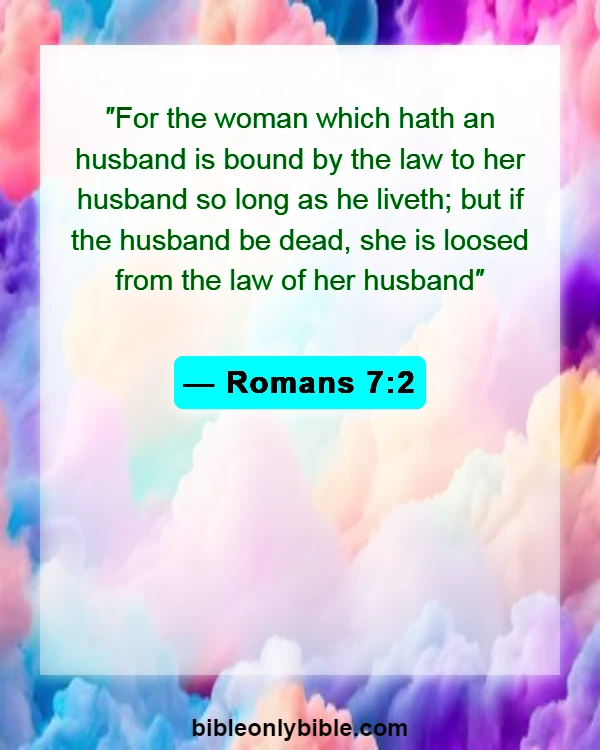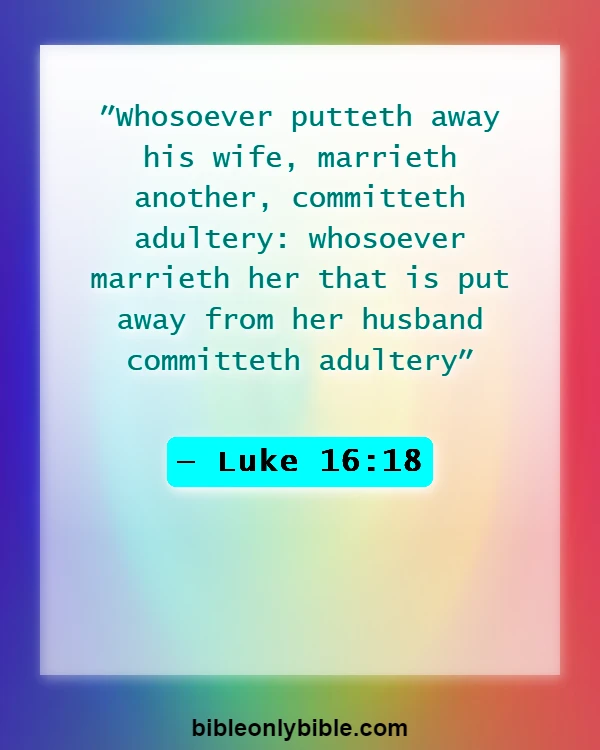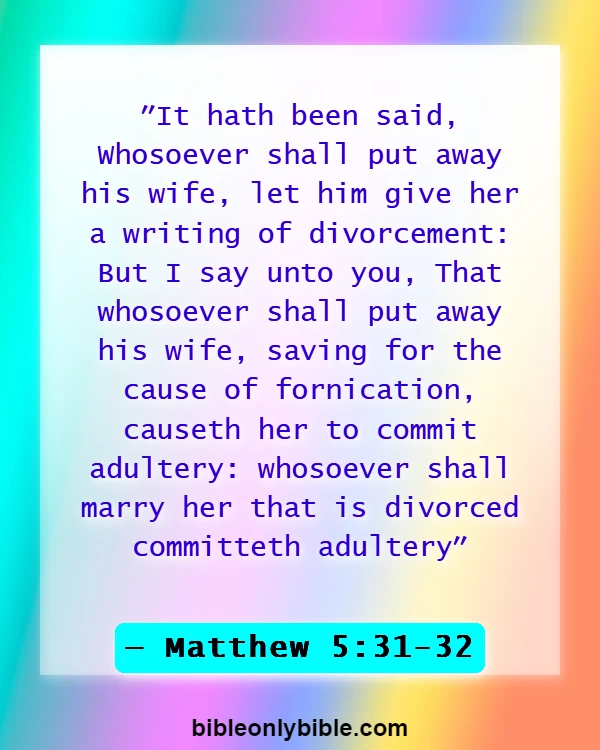Friends, if you’re searching for “Bible Verses About Divorce And Remarriage,” this content is for you. Today, I share Bible verses that can help you better understand divorce and remarriage according to the Bible. These scriptures offer guidance on this complex topic, providing insight into God’s perspective on marriage, divorce, and the possibility of remarriage. Whether you’re seeking clarity for personal reasons or to support others, these verses will help illuminate the biblical stance on this sensitive subject.
Contents
- 1 What Does the Bible Say About Divorce?
- 1.1 Matthew 19:6 – God unites in marriage, man shouldn’t separate
- 1.2 Mark 10:9 – Let no one separate what God has joined
- 1.3 1 Corinthians 7:10 – The Lord commands: a wife must not separate
- 1.4 Malachi 2:16 – God dislikes divorce, emphasizes marital faithfulness
- 1.5 Matthew 5:32 – Divorce leads to adultery except for sexual immorality
- 2 Biblical Grounds for Divorce According to Scripture
- 3 Bible Verses About Remarriage After Divorce
- 3.1 Romans 7:2 – Bound by law to husband while he lives
- 3.2 1 Corinthians 7:39 – Freedom to remarry after a spouse’s death
- 3.3 Luke 16:18 – Remarrying after divorce equates to committing adultery
- 3.4 Mark 10:11 – Remarrying after divorce equals committing adultery
- 3.5 Deuteronomy 24:2 – Remarriage allowed after lawful divorce
- 4 Is Remarriage a Sin According to the Bible?
- 5 Jesus’ Teachings on Divorce and Remarriage
- 6 Old Testament vs New Testament Views on Divorce
- 7 Can Divorced Christians Remarry and Still Please God?
- 8 Biblical Guidance for Those Considering Divorce
What Does the Bible Say About Divorce?
When it comes to the topic of divorce, the Bible offers insights that can guide and comfort us. Scripture addresses the complexities of marriage and the heartache of separation. It stresses the importance of commitment but also acknowledges human imperfections. As we explore these verses, let’s seek understanding and compassion, recognizing that each situation is unique and requires thoughtful consideration.
Matthew 19:6 – God unites in marriage, man shouldn’t separate

Wherefore they are no more twain, but one flesh. What therefore God hath joined together, let not man put asunder
Matthew 19:6
Explanation:- In this verse, Jesus emphasizes that marriage is a sacred union established by God. Once two are united in marriage, they become one flesh, and human authority should not dissolve this bond. This underscores the divine intention for permanence and commitment in marriage.
Mark 10:9 – Let no one separate what God has joined

What therefore God hath joined together, let not man put asunder
Mark 10:9
Explanation:- This verse highlights the sanctity of marriage, emphasizing that it is a union created by God. It suggests that human actions should not dissolve this divine bond, encouraging couples to honor and preserve their commitment to each other.
1 Corinthians 7:10 – The Lord commands: a wife must not separate

Unto the married I command, yet not I, but the Lord, Let not the wife depart from her husband
1 Corinthians 7:10
Explanation:- This verse conveys a directive from the Lord, emphasizing the importance of marital commitment. It underscores the sanctity of marriage, urging couples to work through challenges rather than pursue separation, reflecting the biblical view of marriage as a lasting covenant.
Malachi 2:16 – God dislikes divorce, emphasizes marital faithfulness

For the Lord , the God of Israel, saith that he hateth putting away: for one covereth violence with his garment, saith the Lord of hosts: therefore take heed to your spirit, that ye deal not treacherously
Malachi 2:16
Explanation:- This verse highlights God’s disapproval of divorce, urging spouses to remain faithful and committed to their marriage. It underscores the importance of honoring the marital covenant and maintaining integrity in relationships, aligning with the broader biblical theme of commitment and love.
Matthew 5:32 – Divorce leads to adultery except for sexual immorality

But I say unto you, That whosoever shall put away his wife, saving for the cause of fornication, causeth her to commit adultery: whosoever shall marry her that is divorced committeth adultery
Matthew 5:32
Explanation:- This verse highlights that divorce can lead to adultery, except in cases of sexual immorality. It underscores the sanctity of marriage, urging careful consideration before ending a marital relationship. The exception for sexual immorality acknowledges serious breaches of marital trust.
Biblical Grounds for Divorce According to Scripture
The Bible outlines specific grounds for divorce, emphasizing the sanctity of marriage while providing guidance when the covenant is broken. These scriptures remind us that marriage is a sacred bond, but in cases of infidelity or abandonment, there is room for grace and healing. As we read, let’s consider how these principles might apply in our own lives or those we know.
Matthew 19:9 – Divorce allowed for marital unfaithfulness only

I say unto you, Whosoever shall put away his wife, except it be for fornication, shall marry another, committeth adultery: whoso marrieth her which is put away doth commit adultery
Matthew 19:9
Explanation:- This verse highlights that divorce is permissible only in cases of marital unfaithfulness. It underscores the sanctity of marriage while acknowledging infidelity as a valid reason for dissolution, urging believers to uphold the commitment unless broken by such betrayal.
1 Corinthians 7:15 – Believer not bound if unbelieving spouse departs

But if the unbelieving depart, let him depart. A brother or a sister is not under bondage in such cases: but God hath called us to peace
1 Corinthians 7:15
Explanation:- This verse explains that if an unbelieving spouse chooses to leave the marriage, the believer is not obligated to remain bound to the union. It acknowledges that peace is preferable, and in such situations, the believer has the freedom to move on.
Deuteronomy 24:1 – Divorce allowed with a certificate of divorce
When a man hath taken a wife, married her, it come to pass that she find no favour in his eyes, because he hath found some uncleanness in her: then let him write her a bill of divorcement, give it in her hand, send her out of his house
Deuteronomy 24:1
Explanation:- Deuteronomy 24:1 discusses the practice of divorce in ancient Israel, allowing a man to divorce his wife if he finds something indecent about her, provided he gives her a certificate of divorce. This establishes a legal procedure, emphasizing the importance of formalizing and acknowledging the separation.
Matthew 5:31 – Divorce requires a certificate, according to Jesus
It hath been said, Whosoever shall put away his wife, let him give her a writing of divorcement
Matthew 5:31
Explanation:- In this verse, Jesus refers to the requirement of giving a certificate of divorce. This underscores the seriousness of divorce, highlighting that it shouldn’t be taken lightly and should follow a formal process, emphasizing the sanctity of marriage.
Bible Verses About Remarriage After Divorce
Remarriage after divorce can be a sensitive subject, and the Bible offers wisdom on this topic. It acknowledges the pain of past relationships while offering hope for new beginnings. As we delve into these verses, let’s think about how God’s love and forgiveness can pave the way for healing and restoration, even after difficult chapters in our lives.
Romans 7:2 – Bound by law to husband while he lives

For the woman which hath an husband is bound by the law to her husband so long as he liveth; but if the husband be dead, she is loosed from the law of her husband
Romans 7:2
Explanation:- This verse illustrates the binding nature of marriage under the law, emphasizing that a woman is bound to her husband as long as he is alive. It highlights the permanence of marital vows and the legal and spiritual bond that marriage entails.
1 Corinthians 7:39 – Freedom to remarry after a spouse’s death

The wife is bound by the law as long as her husband liveth; but if her husband be dead, she is at liberty to be married to whom she will; only in the Lord
1 Corinthians 7:39
Explanation:- This verse highlights the freedom to remarry after the death of a spouse, emphasizing that the bond of marriage is dissolved upon a spouse’s passing. It underscores the importance of making choices aligned with Christian faith when considering remarriage.
Luke 16:18 – Remarrying after divorce equates to committing adultery

Whosoever putteth away his wife, marrieth another, committeth adultery: whosoever marrieth her that is put away from her husband committeth adultery
Luke 16:18
Explanation:- This verse teaches that marrying someone after divorcing their spouse is considered adultery. It underscores the sanctity of marriage and highlights the seriousness with which vows should be taken, encouraging careful consideration and respect for marital commitments.
Mark 10:11 – Remarrying after divorce equals committing adultery

He saith unto them, Whosoever shall put away his wife, marry another, committeth adultery against her
Mark 10:11
Explanation:- In this verse, Jesus teaches that remarrying after divorce constitutes adultery, highlighting the sanctity and permanence of marriage. This underscores the seriousness of marital vows and encourages believers to view marriage as a lifelong commitment.
Deuteronomy 24:2 – Remarriage allowed after lawful divorce
When she is departed out of his house, she may go be another man’s wife
Deuteronomy 24:2
Explanation:- This verse discusses the permissibility of remarriage after a lawful divorce, highlighting the recognition of a woman’s right to remarry once she has been formally divorced. It underscores the acceptance of moving forward and rebuilding one’s life within the context of biblical law.
Is Remarriage a Sin According to the Bible?
The question of whether remarriage is a sin is one that many grapple with, and the Bible provides perspectives that can illuminate our understanding. These scriptures explore the conditions under which remarriage is viewed, highlighting the importance of faithfulness and integrity. As we reflect, let’s consider how these teachings might inspire us to live in a way that honors God’s plan for our lives.
Romans 7:3 – Remarriage permissible if spouse has died
So then if, while her husband liveth, she be married to another man, she shall be called an adulteress: but if her husband be dead, she is free from that law; so that she is no adulteress, though she be married to another man
Romans 7:3
Explanation:- In this verse, it is stated that if a woman’s husband dies, she is free to remarry without being considered an adulteress. This suggests that remarriage is permissible in the case of a spouse’s death, aligning with biblical teachings on marriage and fidelity.
1 Corinthians 7:11 – Remain unmarried or reconcile with your spouse

But if she depart, let her remain unmarried or be reconciled to her husband: let not the husband put away his wife
1 Corinthians 7:11
Explanation:- This verse advises those who are separated to either remain unmarried or reconcile with their spouse. It highlights the importance of commitment in marriage, suggesting that reconciliation is preferred over entering into a new marriage after separation.
Jesus’ Teachings on Divorce and Remarriage
Jesus’ teachings on divorce and remarriage cut to the heart of commitment and fidelity. He emphasized the original design for marriage and the seriousness of the vows we make. These verses encourage us to strive for relationships that mirror God’s enduring love, even in the face of challenges. Let’s explore how His teachings can guide us in building strong, lasting bonds.
Matthew 19:4-6 – God joins couples; man shouldn’t separate them
He answered said unto them, Have ye not read, that he which made them at the beginning made them male femaleAnd said, For this cause shall a man leave father mother, shall cleave to his wife: they twain shall be one flesh?Wherefore they are no more twain, but one flesh. What therefore God hath joined together, let not man put asunder
Matthew 19:4-6
Explanation:- In this passage, Jesus highlights the sanctity of marriage, emphasizing that it is a divine union created by God. He teaches that when two individuals marry, they become one entity, and thus, human intervention should not separate this sacred bond.
Mark 10:2-12 – Jesus teaches against divorce and remarriage
The Pharisees came to him, asked him, Is it lawful for a man to put away his wife? tempting himAnd he answered said unto them, What did Moses command you?they said, Moses suffered to write a bill of divorcement, to put her awayAnd Jesus answered said unto them, For the hardness of your heart he wrote you this preceptBut from the beginning of the creation God made them male femaleFor this cause shall a man leave his father mother, cleave to his wifeAnd they twain shall be one flesh: so then they are no more twain, but one fleshWhat therefore God hath joined together, let not man put asunderAnd in the house his disciples asked him again of the same matterAnd he saith unto them, Whosoever shall put away his wife, marry another, committeth adultery against herAnd if a woman shall put away her husband, be married to another, she committeth adultery
Mark 10:2-12
Explanation:- In this passage, Jesus emphasizes the sanctity of marriage, teaching that divorce and remarriage go against God’s original design. By highlighting the commitment and unity intended in marriage, Jesus calls for faithfulness and underscores the seriousness of the marital bond.
Matthew 5:31-32 – Jesus warns against divorce and unjust remarriage

It hath been said, Whosoever shall put away his wife, let him give her a writing of divorcementBut I say unto you, That whosoever shall put away his wife, saving for the cause of fornication, causeth her to commit adultery: whosoever shall marry her that is divorced committeth adultery
Matthew 5:31-32
Explanation:- In this passage, Jesus highlights the seriousness of marriage, warning against divorce except in cases of sexual immorality. He cautions that unjust remarriage can lead to adultery, urging individuals to honor their marital commitments and consider the spiritual implications of their actions.
Old Testament vs New Testament Views on Divorce
The perspectives on divorce in the Old and New Testaments reveal a progression in understanding God’s will for marriage. While the Old Testament provides laws and allowances, the New Testament emphasizes grace and redemption. As we look at these scriptures, let’s consider how they reflect God’s unchanging love and His desire for our relationships to thrive in His truth.
Matthew 19:8 – Divorce allowed due to hard hearts, not God’s intention

He saith unto them, Moses because of the hardness of your hearts suffered you to put away your wives: but from the beginning it was not so
Matthew 19:8
Explanation:- In this verse, Jesus explains that divorce was permitted by Moses because of people’s stubbornness, but it was never God’s original plan. This highlights the difference between human allowances and divine intentions, emphasizing the sanctity and permanence of marriage in God’s eyes.
1 Corinthians 7:10-11 – Stay married; reconciliation encouraged after separation

Unto the married I command, yet not I, but the Lord, Let not the wife depart from her husbandBut if she depart, let her remain unmarried or be reconciled to her husband: let not the husband put away his wife
1 Corinthians 7:10-11
Explanation:- This passage advises married couples to remain together and encourages reconciliation if separation occurs. It reflects the New Testament’s emphasis on preserving marriage, contrasting with the more permissive Old Testament views on divorce, highlighting a shift towards commitment and unity.
Mark 10:4-5 – Divorce allowed due to hard hearts, not ideal
They said, Moses suffered to write a bill of divorcement, to put her awayAnd Jesus answered said unto them, For the hardness of your heart he wrote you this precept
Mark 10:4-5
Explanation:- In these verses, Jesus explains that Moses permitted divorce due to people’s hard-heartedness, highlighting that it wasn’t part of God’s original design for marriage. This underscores the contrast between human weakness and God’s ideal vision for marital unity.
Can Divorced Christians Remarry and Still Please God?
Many wonder if remarriage after divorce aligns with a life that pleases God. The Bible offers guidance, highlighting the importance of repentance and a sincere heart. These verses remind us that God’s grace is sufficient, and His love can cover our past. As we reflect on these teachings, let’s find hope in the possibility of redemption and new beginnings.
1 Corinthians 7:27-28 – Marriage after divorce is not sinful
Art thou bound unto a wife? seek not to be loosed. Art thou loosed from a wife? seek not a wifeBut if thou marry, thou hast not sinned; if a virgin marry, she hath not sinned. Nevertheless such shall have trouble in the flesh: but I spare you
1 Corinthians 7:27-28
Explanation:- This passage reassures that marriage after divorce is not inherently sinful. It acknowledges that life’s circumstances can change, and choosing to remarry is permissible. The focus is on maintaining faith and integrity within new relationships, aligning personal choices with God’s teachings.
Romans 7:2-3 – Bound by law until spouse’s death
For the woman which hath an husband is bound by the law to her husband so long as he liveth; but if the husband be dead, she is loosed from the law of her husbandSo then if, while her husband liveth, she be married to another man, she shall be called an adulteress: but if her husband be dead, she is free from that law; so that she is no adulteress, though she be married to another man
Romans 7:2-3
Explanation:- This passage illustrates the principle that a married person is bound to their spouse under the law until death. It metaphorically underscores the binding nature of marital vows and raises questions about the spiritual implications of divorce and remarriage for Christians.
Biblical Guidance for Those Considering Divorce
For those contemplating divorce, the Bible provides wisdom that encourages thoughtful consideration and prayerful discernment. These scriptures emphasize the value of reconciliation and the hope of restoration. As we explore these teachings, let’s seek God’s guidance in making choices that align with His love and purpose for our lives, remembering that He is with us through every step.
Ephesians 4:32 – Be kind, compassionate, forgiving, as God forgave you

Be ye kind one to another, tenderhearted, forgiving one another, even as God for Christ’s sake hath forgiven you
Ephesians 4:32
Explanation:- Ephesians 4:32 encourages kindness, compassion, and forgiveness, reflecting God’s forgiveness toward us. In the context of divorce and remarriage, these virtues guide individuals to approach their circumstances with grace and empathy, fostering healing and reconciliation in difficult situations.
